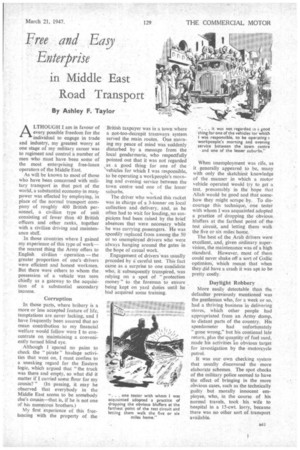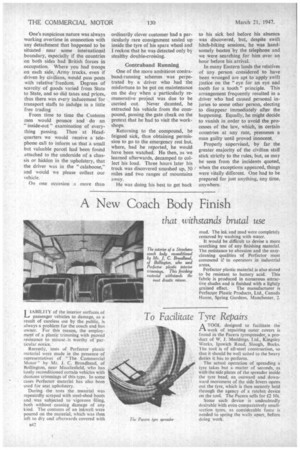Free and Bag Enterprise
Page 47

Page 48

If you've noticed an error in this article please click here to report it so we can fix it.
in Middle East Road Transport
By Ashley F. Taylor LTHOUGH I am in favour of
every possible freedom for the individual to engage in trade and industry, my greatest worry at one stage of my military career was to regiment and control a number of men who must have been some of the most enterprising free-lance operators of the Middle East.
As will be known to most of those who have been concerned with military transport in that part of the world, a substantial economy-in man; power was effected by employing, in place of the normal transport company of roughly 400 British personnel, a civilian type of unit consisting of fewer than 40 British officers and other ranks, together with a civilian driving and maintenance staff.
In those countries where I gained my experience of this type of work— the nearest thing the Army offers to English civilian operation — the greater proportion of one's -drivers were efficient and honest workmen. But there were others to whom the. possession of a vehicle was seen chiefly as a gateway to the acquisition of a substantial secondary income.
Corruption
In those parts, where bribery is a more or less accepted feature of life, temptations are never lacking, and I have frequently been assured that no mean contribution to my financial welfare would follow were I to concentrate on maintaining a conveniently turned blind eye.
Although I spared no pains to check the " pirate " haulage activities that went on, I must confess to a sneaking regard for the Eastern logic, which argued that "the truck was there and empty, so what did it matter if I carried some flour for my cousin?" (In passing, it may he observed that everybody in the Middle East seems to be somebody else's cousin—that is, if he is not one of his numerous brothers.)
My first experience of this freelancing with the property of the British taxpayer was in a town where a not-too-decrepit tramways system served the main routes. One morning my peace of mind was suddenly disturbed by a message from the local gendarmerie, who respectfully pointed out that it was not regarded as . a good thing for one of the \ vehicles for which I was responsible, to be operating a workpeople's morning and evening service between the town centre and one of the lesser suburbs.
The driver who worked this racket was in charge of a 3-tonner on local collection and delivery, and, as he often had to wait forloading,_no suspicions had been raised by the brief absences that were necessary. while he was carrying passengers. He was speedily replaced from among the 50 or so unemployed drivers who were always hanging around the gates in the hope of casual work.
Engagement of drivers was usually preceded by a-careful test. This fact came as a surprise to one candidate who, it subsequently transpired, was relying on a spot of "protection money " to the foreman to ensure being kept on yard duties until he had acquired some training.
When unemployment was rife, as it generally appeared to be, many with only the sketchiest knowledge of the manner in which a motor vehicle operated would try to get a test, presumably in the hope that Allah would be good and that somehow they might scrape by. To discourage this technique, one tester with whom I was acquainted adopted a practice of dropping the obvious bluffers at the farthest point of the test circuit, and letting them walk the five or six miles home.
The best of the Arab drivers were excellent, and, given ordinary supervision, the maintenance was of a high standard. However, most of them could never shake off a sort of Gallic optimism, which meant that when they did have a crash it was apt to be pretty costly.
Daylight Robbery
More easily detectable than the defaulter previously mentioned was the gentleman who, for a week or so, had a thriving business in delivering stores, which other people had appropriated from an Army dump, to distant parts of the country. His speedometer had unfortunately "gone wrong," but his continual late return, plus the quantity of fuel used, made his activities 'an obvious target for investigation by the motorcycle patrol.
It was our own checking system that usually discovered the more elaborate schemes. The spot checks of the military police seemed to have the effect of bringing in the more obvious eases, such as the technically guilty but morally innocent employee, who, in the course of his normal travels, took his wife to hospital in a 15-cwt. lorry, because there was no other sort of transport available. One's suspicious nature was always working overtime in connection with any detachment that happened to be situated near some international boundary, especially if the countries on both sides had British forces in occupation. Where you had troops on each side, Army trucks, even if driven by civilians, would pass posts with relative freedom. Degrees of scarcity of goods varied from State to State, and so did taxes and prices, thus there was every inducement for transport staffs to indulge in a little free trading From time to time the Customs men would pounce and do an " inside-out " examination of everything passing. Then at Headquarters we would receive a: telephone call to inform us that a small but valuable parcel had been found attached to the underside of a chassis or hidden in the upholstery, that the driver was in the "calaboose," and would we please collect our vehicle.
On one occasion a mom than ordinarily clever customer had a particularly rare consignment sealed up inside the tyre of his spare wheel and reckon that he was detected only by stealthy double-crossing.
Contraband Running One of the more ambitious contraband-running schemes was perpetrated by a driver who had the misfortune to be put on maintenance on the day when a particularly remunerative project was due to be carried out. Never daunted, he extracted his vehicle from the compound, passing the gate cheek on the pretext that he had to visit the workshops.
Returning to the compound, he feigned sick, thus obtaining permission to go to the emergency rest hut, where, had he reported, he would have been watched. He then, as we learned afterwards, decamped to collect his load. Three hours later his truck was discovered smashed up, 50 miles and two ranges of mountains away.
He was doing his best to get back to his sick bed before his absence was discovered, but, despite swift hitch-hiking sessions, he was handsomely beaten by the telephone and we were searching for him over an hour before his arrival. • In many Eastern lands the relatives of any person considered to have been wronged are apt to apply swift justice on the "eye for an eye and tooth for a tooth" principle. This arrangement frequently resulted in a driver who had caused personal injuries to some other person, electing to disappear immediately after the happening. Equally, he might decide to vanish in order to avoid the processes of the law, which, in certain countries at any rate, presumes a man guilty until proved innocent.
Properly supervised, by far the greater majority of the civilian staff stick strictly to the rules, but, as may be seen from the incidents quoted, when the exceptions appeared, things were vitally different. One had to be prepared for just anything, any time, anywhere:












































































